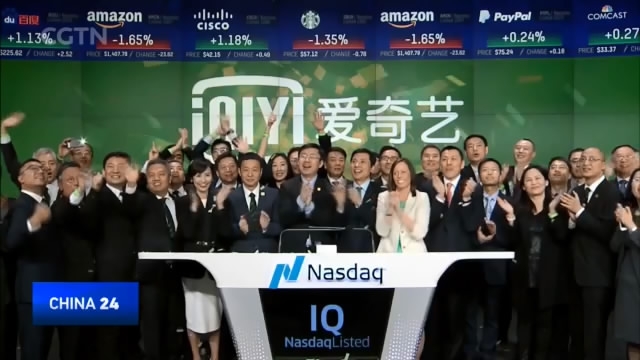
21:35, 30-Mar-2018
iQiyi IPO: Chinese video streaming giant goes public in US markets

Chinese video streaming giant, iQiyi just went public in the United States with an initial public offering price of 18 dollars per share - the middle of its marketed range. It raised 2-point-25 billion dollars, making it the second biggest IPO in the US this year and the biggest Chinese listing in the US since Alibaba. However, the stock's price fell over 10 percent of its IPO price at one time after listing. Karina Huber has more from New York.
With the ringing of the opening bell at the NASDAQ on Thursday, shares of iQiyi known as the Netflix of China, began trading under the ticker IQ in the United States.
The first trade came in at $18.20 a share, which was 20 cents higher than its initial public offering price but closed at $15.55. The company raised 2.25 billion dollars in the offering.
According to its securities filing, iQiyi majority owned by Baidu, will use half the money to expand and enhance its content offerings as it goes head to head with rivals Tencent and Alibaba in the streaming video space.
KARINA HUBER NEW YORK iQiyi's IPO comes on the heels of several disappointing Chinese offerings in the United States this year. Huami, a fitness tracking company, that launched in February, is currently trading below its IPO price-which is unusual for a tech stock. Chinese app maker, Bilibili, which went public on Wednesday, is also trading under its initial price.
Traders at the New York Stock Exchange say there is still lots of interest in Chinese companies but U.S. investors are also more hesitant than in the past.
PETER COSTA, PRESIDENT EMPIRE EXECUTIONS "With trade embargoes, trade tariffs and trade war and trade this and trade that, I think even though some of these companies have really nothing to do with that space, I think the overall impression or the overall sentiment towards Chinese equities is probably not as good as it once was."
Another trader says investors are pickier now because of softness in the market. The S&P 500 is down five percent from a month ago.
MATT CHESLOCK, EQUITY TRADER VIRTU FINANCIAL "Now you're seeing investors that are a little more patient. They've seen these IPOs price weekly. They've watched the fast money get out of them and then they get into them when they think there's some kind of discount."
According to Renaissance Capital, in 2017 there were 16 Chinese companies that went public in the U.S. raising 3.4 billion dollars. The expectation was that 2018 would be an even bigger year for Chinese listings in the U.S. but with these disappointing IPOs perhaps Chinese companies will opt for Hong Kong instead of the U.S. when wanting to go public. Karina Huber, CGTN, New York.

SITEMAP
Copyright © 2018 CGTN. Beijing ICP prepared NO.16065310-3
Copyright © 2018 CGTN. Beijing ICP prepared NO.16065310-3